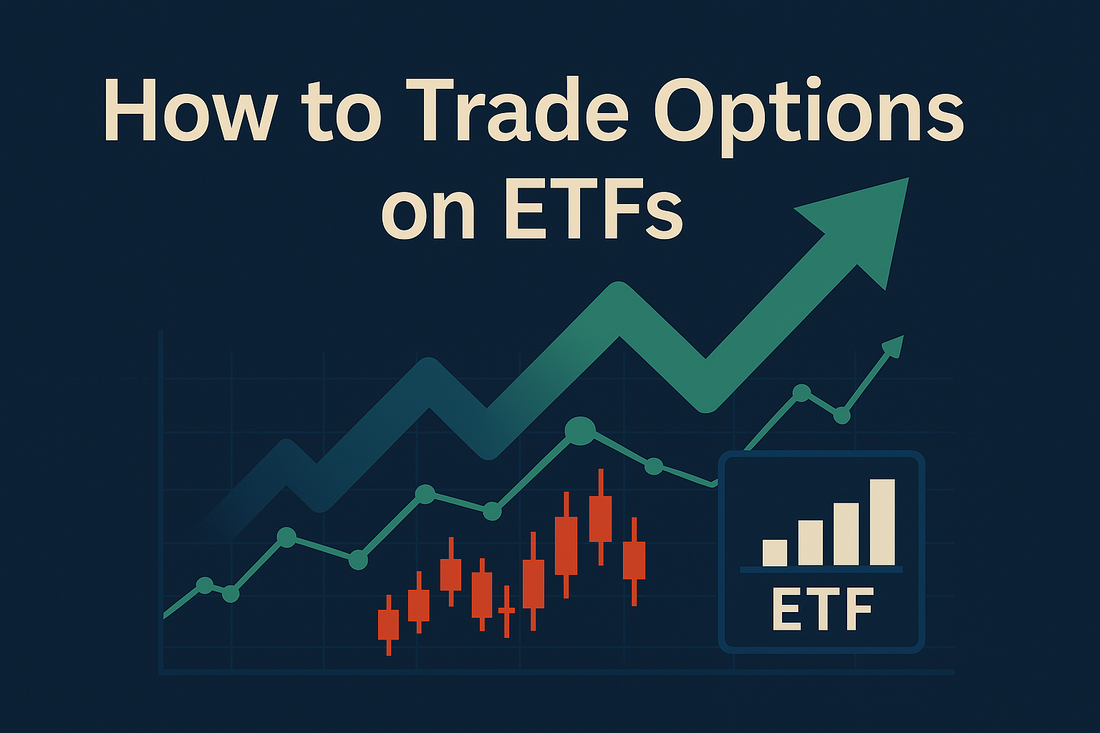
How to Trade Options on ETFs
If you’re looking to build a scalable, strategic trading plan without relying on individual stock picks, ETF options might be the answer. For the self-driven trader working towards financial freedom, ETF options offer a diverse, flexible, and potentially safer way to participate in the markets.
In this ultimate guide, we’ll explore:
- What ETF options are and how they work
- The key advantages of trading ETF options
- Popular strategies that work well with ETFs
- Essential risk considerations
- Visual performance overlays for various strategies
- Real-world examples
- A clear path to action so you can start building your edge today
📘 What Are ETF Options?
ETF options are derivative contracts based on exchange-traded funds (ETFs) like SPY (S&P 500), QQQ (Nasdaq 100), or IWM (Russell 2000). Each option gives the buyer the right, but not the obligation, to buy or sell 100 shares of the underlying ETF at a specific price before the expiration date.
They function similarly to stock options, but since ETFs represent baskets of assets, their price movements are more diversified and less volatile than individual stocks. That makes ETF options ideal for those seeking consistency and strategic control.
🌟 Advantages of Trading Options on ETFs
Here’s why more smart traders are incorporating ETF options into their playbooks:
1. Diversification in a Single Trade
ETFs provide exposure to entire sectors or indices. This allows you to reduce risk associated with single stocks and benefit from broader trends.
💡 Example: Buying a call option on SPY lets you express a bullish view on the entire U.S. stock market rather than betting on just Apple or Microsoft.
2. High Liquidity
Major ETFs have deep options markets with tight bid-ask spreads, allowing smoother entries and exits with minimal slippage. This is key when you’re managing trades actively or using multi-leg strategies like spreads or condors.
3. Strategic Flexibility
ETF options support a wide range of strategies:
- Covered calls
- Credit spreads
- Debit spreads
- Iron condors
- Calendar spreads
- Protective puts
Each strategy can be tailored to suit your risk tolerance and trading objectives.
4. Macro Exposure
ETF options let you trade macroeconomic themes—without needing futures or forex experience.
- Bullish on U.S. tech? Try QQQ options
- Bearish on small caps? Try IWM put spreads
- Want to hedge inflation? Trade options on GLD (Gold ETF) or XLE (Energy ETF)
5. Ideal for Defined-Risk Trading
When you're trading your own capital, risk management is everything. ETF options naturally suit defined-risk strategies because the underlying instruments are less prone to extreme price swings.
🧠 Strategy Examples for Trading ETF Options
Let’s now dive into some specific trading strategies that work particularly well with ETFs. We’ll also discuss when and why you might use each one.
📈 1. Covered Call on SPY
Use Case: Generate consistent income from ETF holdings
How It Works: You own 100 shares of SPY and sell an out-of-the-money (OTM) call against it, collecting premium.
Example:
- SPY at $500
- Sell 1 SPY 510 Call for $2.50
- If SPY stays below $510, you keep the premium
- If SPY closes above $510, your shares are called away at a profit
Why It Works: Covered calls reduce downside risk slightly and provide weekly/monthly cash flow. SPY is an excellent candidate due to its liquidity and predictable behavior.
📉 2. Bear Put Spread on QQQ
Use Case: You expect QQQ to drop in the near term
How It Works: Buy a put at-the-money and sell a further out-of-the-money put to reduce cost.
Example:
- Buy 1 QQQ 430 Put
- Sell 1 QQQ 420 Put
- Cost: $4.50
- Max profit: $5.50 (if QQQ closes at or below $420)
Why It Works: It provides a defined risk, high reward trade without the capital intensity of shorting or buying naked puts.
🔲 3. Iron Condor on IWM
Use Case: You expect low volatility or range-bound behavior
How It Works: Sell a put spread and a call spread around the current price to collect premium from both sides.
Example:
- Sell IWM 180 Put / Buy 175 Put
- Sell IWM 200 Call / Buy 205 Call
- Total Credit: $2.00
- Max Loss: $3.00 (per spread)
Why It Works: Iron condors profit if IWM stays within the range. Ideal for neutral markets.
🧮 4. Calendar Spread on DIA
Use Case: Profit from time decay and volatility changes
How It Works: Sell a near-term option and buy a longer-term option at the same strike.
Example:
- Sell DIA 380 Call expiring in 1 week
- Buy DIA 380 Call expiring in 1 month
Why It Works: This strategy benefits when the stock stays near the strike price and implied volatility increases on the long leg. Best used around earnings or macro events.
📊 Strategy Summary Table
|
Strategy |
Ideal ETF |
Market Outlook |
Risk |
Reward |
Best Use Case |
|
Covered Call |
SPY |
Slightly Bullish |
Low |
Moderate |
Monthly Income |
|
Bear Put Spread |
QQQ |
Bearish |
Medium |
High |
Downside Bet |
|
Iron Condor |
IWM |
Neutral |
Low |
Steady |
Range-bound Market |
|
Calendar Spread |
DIA |
Neutral/Volatile |
Medium |
High |
Volatility Play |
📈 Visual Overlay: ETF Movement vs Strategy P/L
📌 Covered Call on SPY
As SPY rises slowly, the P/L curve flattens, reflecting the capped profit potential while still collecting premium.

📌 Bear Put Spread on QQQ
With QQQ declining, your profit rises rapidly and maxes out once it hits the lower strike.

📌 Iron Condor on IWM
Price movements within the inner strike prices generate max profit. Volatility is your enemy here.

📌 Calendar Spread on DIA
The position peaks when price remains near the strike. If volatility rises, profit expands further.

⚠️ Risk Considerations When Trading ETF Options
ETF options are safer than many alternatives—but risks remain. Here's what to keep in mind:
1. Time Decay
Options lose value over time. Be sure to match your time horizon with the option’s expiry.
📉 Don’t overpay for long-dated options if you expect a quick move.
2. Volatility Swings
Low-volatility ETFs may suddenly spike due to macro news (rate hikes, war, etc). Strategies like iron condors are vulnerable during these spikes.
3. Correlation Risk
Don’t open too many similar trades across SPY, QQQ, and DIA—they’re often highly correlated. If the market drops, all of them may suffer simultaneously.
4. Early Assignment
For short options (especially in spreads or covered calls), there’s a risk of early assignment—especially near dividend dates.
5. Overtrading
Options can be addictive. Stick to a defined plan. Paper trade your strategy first, especially if you’re new to multi-leg positions.
🔍 Real-World Trader Example
Name: Sarah, 29, full-time digital marketer
Goal: Build passive income while working
Strategy: Bi-weekly covered calls on QQQ and monthly condors on IWM
Result (12 months):
- Grew account from $10k to $17.2k
- Developed confidence in theta-based strategies
- Now runs a weekly watchlist and logs every trade
Takeaway: You don’t need to be full-time to see real growth—just consistent, focused, and strategic.
💼 Pro Tips for Self-Sufficient Traders
If you're serious about building wealth through options, here's what separates the hobbyist from the professional:
✅ Track every trade
✅ Backtest new strategies on platforms like ThinkOrSwim or TradingView
✅ Understand the Greeks
✅ Join a supportive mentorship group
✅ Never risk more than 2-3% of capital per trade
✅ Use liquid ETFs and avoid low-volume tickers
🔗 Further Reading (Internal Links)
Boost SEO and value with these related reads on your site:
- Understanding Options Expiration: What You Need to Know
- Mastering Weekly Options
- Top 5 Option Strategies Every Trader Should Know
🚀 Final Thoughts: Why ETF Options Deserve Your Attention
ETF options are the ideal middle ground—combining the flexibility of options with the diversification of ETFs. Whether you're hedging, generating income, or trading directionally, ETF options offer the tools to build a consistent and scalable trading business.
And unlike individual stocks, ETFs don't go bankrupt. Their diversified nature makes them more predictable and better suited for long-term options strategies.
🎯 Your Next Move
At www.optionstranglers.com.sg, we offer:
- 💡 In-depth live 1-1 sessions / group classes
- 📊 Trade examples and breakdowns
- 🤝 Community mentorship and support
👉 Ready to upgrade your strategy and trade like a pro?
Visit www.optionstranglers.com.sg and start your journey to financial freedom today.
Your future is an option. Choose wisely.
⚠️ Disclaimer:
Options involve risk and are not suitable for all investors. Always consult with a financial advisor before investing.
